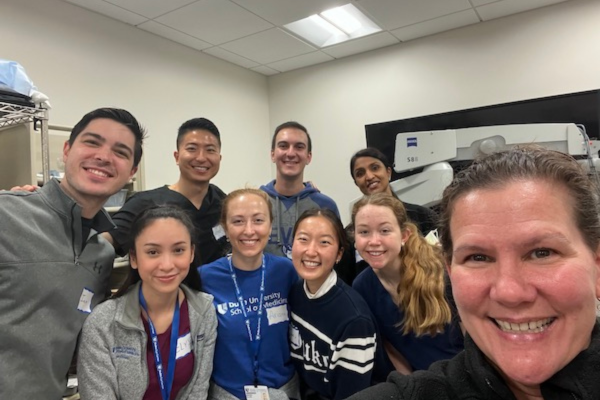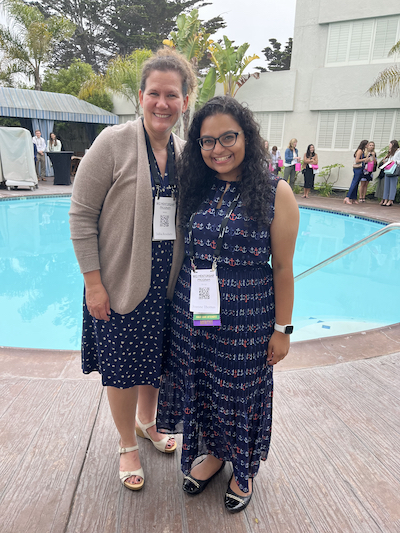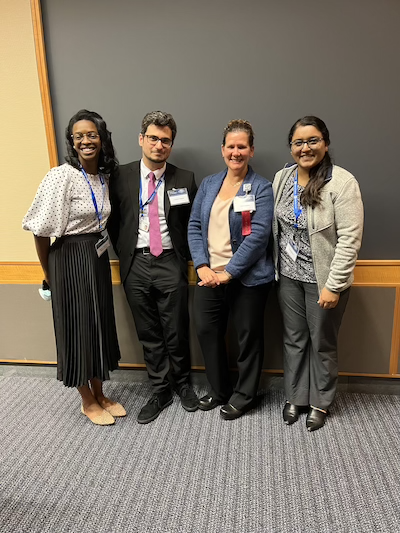
Education is a passion for Jullia Rosdahl, MD, PhD, associate professor of ophthalmology and director of the medical student program at Duke Eye Center. She is passionate about medical education, patient education and the importance of wellness and taking care of yourself.
Medical Education
Rosdahl became the medical student education director at Duke Eye Center in 2018. She knew that she had an opportunity to make a difference in the lives of med students and encourage them to consider ophthalmology as a specialty. The Duke Ophthalmology medical student rotation is unique; it includes dedicated teaching sessions such as the clinically oriented anatomy session and case sessions with eye center faculty and residents, as well as a community service project, and the ability to tailor the clinical activities to each students’ goals. Students also have the access to low vision curriculum and a microsurgery curriculum developed in collaboration with prior Duke medical students, one of the few programs in the country to offer this.
“I am really proud of our microsurgery course. During the course, students learn microscope basics, use foot petal at scope, drape a patient, what instruments are used for, pupillary distance suturing basics, have scopes to take home to practice suture, and learn how to measure pupillary distance, said Rosdahl. “This robust 4-week course really digs into the key functions of what it takes to be an ophthalmologist.”

Focus on Medical Education During COVID Shutdown
When the world shut down for the COVID-19 pandemic, med students were not able to come for clinical rotations; Rosdahl knew she had to continue teaching, so she created the Duke Ophthalmology Virtual Medical Student Elective. The goal was to continue educating med students even if virtually, especially to reach those that are most impacted by COVID.
“It was special to be able to help educate those impacted by the pandemic. And what is one of the best parts is that students were getting to experience the greatness of Duke Eye Center who may not have been able to, said Rosdahl. “A lot of the students who participated in the virtual elective matched to ophthalmology residency programs including at Duke.”
Even when visiting med students were allowed back at Duke in-person, she decided that the virtual elective was such a success, it should be continued each year, but focusing more on students who are minorities and those who are at med schools where there is no home ophthalmology program.
The virtual elective has continued, and Rosdahl is content to have her students back onsite to see first-hand what ophthalmology is about.

Growing Underrepresented Minorities in Ophthalmology
The field of ophthalmology is one of the least diverse in medicine. Rosdahl has been instrumental in growing the number of Underrepresented Minorities in Ophthalmology. She routinely participates in the various programs to grow minorities in ophthalmology such as the Student National Medical Association, the American Academy of Ophthalmology MOM program, serves on the Duke Eye Center equity, diversity, and inclusion council, and encourages minority medical students who rotate through Duke Eye Center to consider a career in ophthalmology.
Patient Education is Key to Treatment Success
Rosdahl started out as molecular/cellular MD/PhD, studying retinal ganglion cells– those are cells that are damaged or killed for Glaucoma. This area of study led to her choosing ophthalmology and ultimately glaucoma as clinical subspecialty.
As glaucoma specialist – trying to save ganglion cells – she understands the importance of saving these neurons and helping her patients understand their disease to avoid the risk of going blind from glaucoma.
In addition to working with her own patients, she serves as the National Eye Institute’s National Eye Health Program (NEHEP) planning group chair. In this role, she serves as a ‘subject matter expert’ in glaucoma, helping to develop equitable, easy to understand patient education materials for glaucoma and other eye diseases. Through NEHEP, she also has the opportunity to collaborate with organizations like Hadley, Bright Focus, and Prevent Blindness. Her passion for patient education led the American Glaucoma Society to ask her to develop and lead a new subcommittee on Patient Engagement in 2020.
“Patient education is so important. Ophthalmologists need to make a connection with their patients to help patients understand what is going on with their eyes, why they need to come to their appointments, why it is important to engage with their therapy, this is where you can have successful outcomes and help your patients maintain their vision, says Rosdahl.
Wellness is Key to Success
Focusing on wellness is important to maintain health and burnout so that physicians can continue to take care of patients. Rosdahl is the wellness director for Duke Eye Center and provides frequent tips and educational information on mental and physical wellness.
She lectures on wellness whenever she can, to remind physicians, students and staff about the importance of taking care of themselves to stay mentally and physically healthy.
“If we are not healthy then it makes a difference in our day-to-day activities, performing our jobs and being present for our loved ones, says Rosdahl.
Rosdahl continues to be a strong advocate and educator on a multitude of situations. She takes pride in this role and makes a difference in the lives of her patients, students, and colleagues on a daily basis.